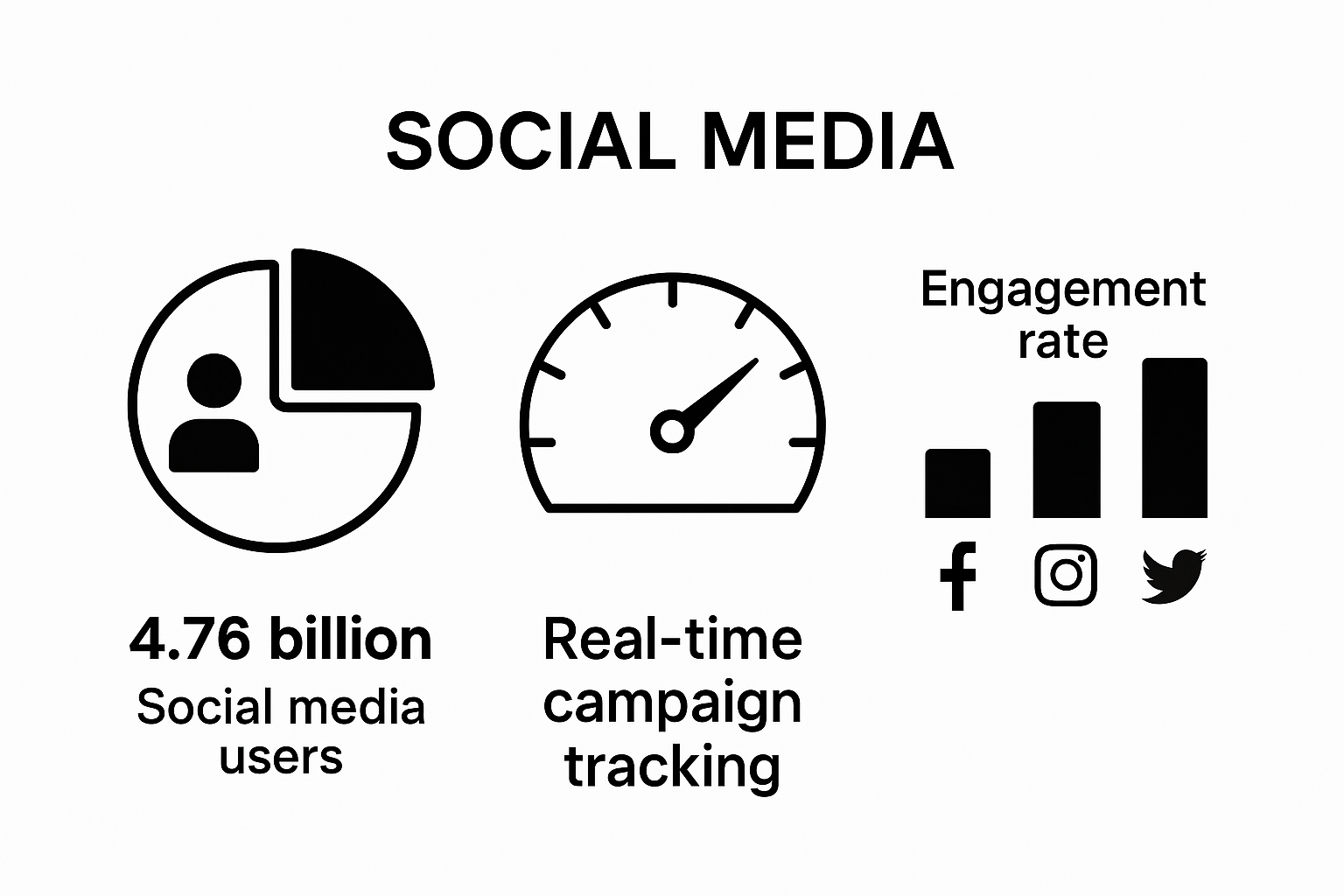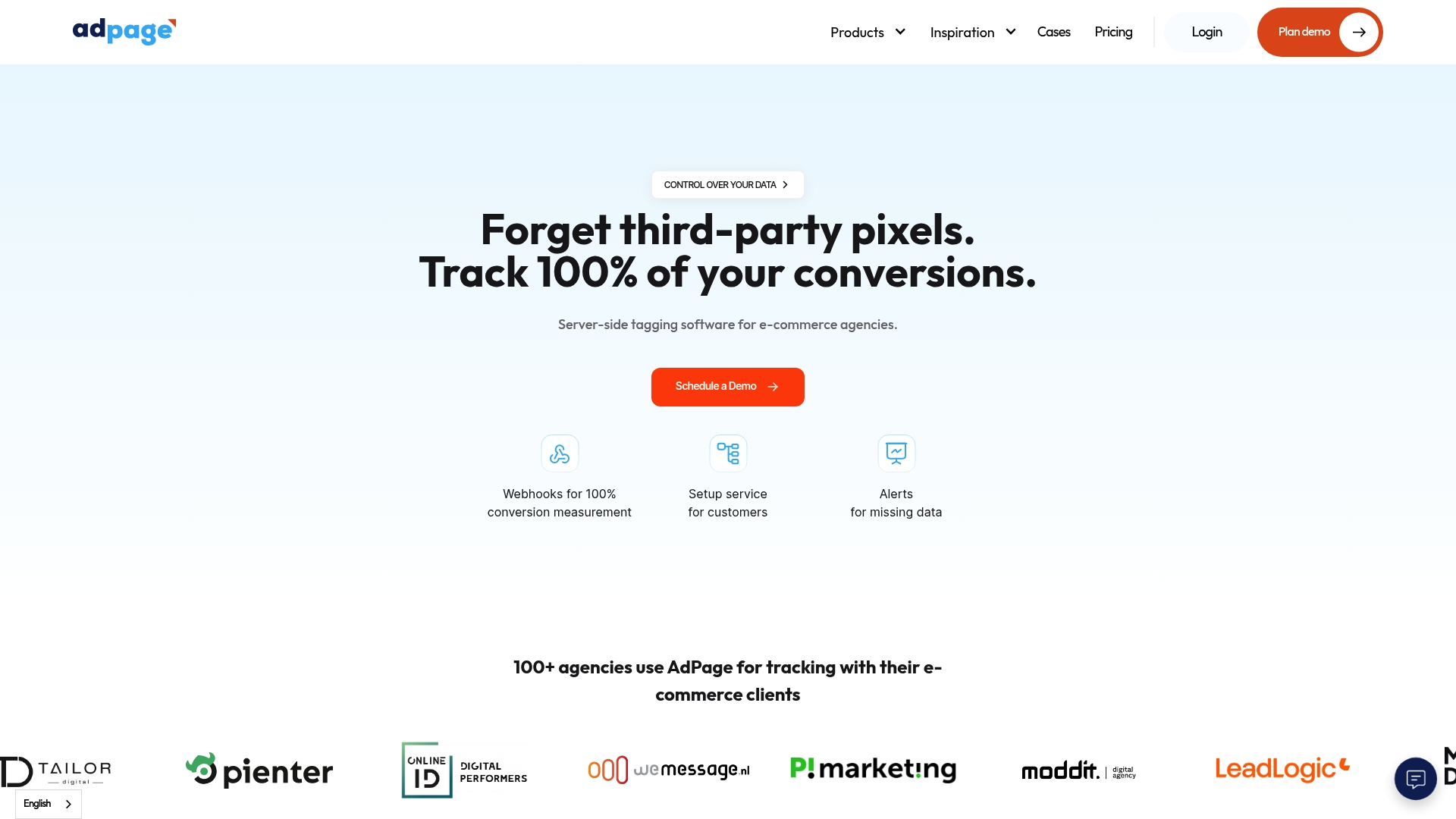Social media has become the heart of modern marketing, connecting businesses with millions in moments. Yet the numbers are far bigger than you might think. Over 4.76 billion people actively use social media worldwide, and each one shapes the market in real time. Most expect this vast audience to lead to mindless brand broadcasts, but the real impact is how it turns strangers into loyal fans through personal connections. Surprised? The secret is less about shouting louder and more about starting real conversations.
Table of Contents
- What Is The Impact Of Social Media On Marketing?
- Why Social Media Is Crucial For Modern Marketing
- How Social Media Influences Consumer Behaviour
- Key Concepts Of Social Media Marketing Strategies
- Real-World Examples Of Social Media Marketing Success
Quick Summary
| Takeaway | Explanation |
|---|---|
| Engage directly with consumers | Social media breaks down communication barriers, allowing real-time interaction and feedback from customers. |
| Leverage data insights for targeting | Utilise sophisticated analytics tools to measure engagement, enabling precise adjustments to marketing strategies. |
| Create authentic brand relationships | Use social media for transparent communication, showcasing values and fostering genuine connections with consumers. |
| Understand psychological triggers | Recognise that social proof and peer recommendations heavily influence purchasing decisions on social media. |
| Adapt content for each platform | Customise marketing strategies to fit the unique characteristics and engagement patterns of different social media platforms. |
What is the Impact of Social Media on Marketing?
Social media has fundamentally transformed marketing strategies, creating unprecedented opportunities for businesses to connect with audiences in dynamic and interactive ways. The impact extends far beyond traditional advertising, reshaping how brands communicate, engage, and build relationships with potential customers.
Revolutionising Customer Engagement
Marketing through social media platforms enables businesses to interact directly with consumers, breaking down traditional communication barriers. Understanding data analysis for marketers reveals that social media provides rich insights into consumer behaviour, preferences, and sentiment.
Key engagement transformations include:
- Real-time customer feedback and interaction
- Personalised marketing communication
- Enhanced brand visibility and reach
According to Hootsuite’s Digital 2023 Report, over 4.76 billion people actively use social media worldwide, representing an enormous potential marketing landscape. This massive user base allows businesses to target specific demographics with unprecedented precision.
Measuring Marketing Performance
Social media platforms offer sophisticated analytics tools that enable marketers to track campaign performance with granular detail. Metrics such as engagement rates, click-throughs, conversions, and audience demographics provide actionable insights that traditional marketing channels could never deliver.
Businesses can now:

- Monitor campaign effectiveness in real-time
- Adjust strategies instantaneously
- Calculate precise return on investment
The integration of social media into marketing strategies represents a paradigm shift from broad, generalized approaches to highly targeted, data-driven communication methods that prioritise individual user experiences and preferences.
To clarify how social media impacts key areas of marketing, the following table compares traditional marketing approaches with social media-driven methods across important dimensions discussed in the article.
| Aspect | Traditional Marketing | Social Media Marketing |
|---|---|---|
| Communication Model | One-way broadcast | Two-way interactive dialogue |
| Audience Targeting | Broad, generalised | Highly targeted and personalised |
| Feedback and Engagement | Delayed, limited | Real-time, direct |
| Data Analytics | Basic, retrospective | Advanced, real-time tracking |
| Brand Relationship | Distant, impersonal | Authentic, relationship-focused |
| Campaign Adjustability | Slow, scheduled | Rapid, responsive |
| Geographical Reach | Often local or national | Global, immediate penetration |
Why Social Media is Crucial for Modern Marketing
Social media has emerged as a transformative force in modern marketing, offering businesses unprecedented opportunities to reach, engage, and convert potential customers. Unlike traditional marketing channels, social platforms provide dynamic, interactive, and highly targeted communication strategies.
Expanding Market Reach
The global digital landscape enables businesses to transcend geographical limitations. Learn more about online marketing basics and understand how social media platforms can exponentially increase brand visibility.
Key market expansion benefits include:
- Access to global audiences
- Cost-effective international marketing
- Immediate geographical penetration
According to Pew Research Center, social media usage continues to grow, with diverse demographic groups actively participating across multiple platforms. This widespread adoption creates rich opportunities for targeted marketing strategies.
Building Authentic Brand Connections
Modern consumers seek genuine connections with brands. Social media platforms facilitate transparent, immediate communication that traditional advertising cannot replicate. Businesses can showcase their values, respond to customer feedback, and create community-driven narratives.
Brands can now:
- Humanise their corporate identity
- Demonstrate corporate social responsibility
- Engage in two-way communication with customers
The strategic use of social media transforms marketing from a one-way broadcast model to an interactive, relationship-building approach that prioritises customer experience and meaningful engagement.
How Social Media Influences Consumer Behaviour
Social media has fundamentally reshaped consumer behaviour, creating complex psychological pathways that dramatically influence purchasing decisions. These platforms serve as powerful ecosystems where consumer perceptions, attitudes, and actions are continuously shaped through digital interactions.
Psychological Triggers in Digital Spaces
Explore the impact of technology on shopping to understand the nuanced psychological mechanisms driving consumer engagement. Social media introduces sophisticated mechanisms that tap into fundamental human psychological needs such as social validation, belonging, and identity construction.
Key psychological triggers include:
- Social proof and peer recommendations
- Fear of missing out (FOMO)
- Personal identity projection
According to Frontiers in Communication, consumer purchase intentions are significantly influenced by social media involvement and self-disclosure mechanisms. Users who actively engage and share personal experiences create intricate networks of trust and influence.
Digital Social Validation
Modern consumers increasingly rely on digital social validation before making purchasing decisions. User reviews, influencer endorsements, and peer recommendations carry substantial weight in shaping consumer perceptions. Social media platforms transform traditional word-of-mouth marketing into a global, instantaneous phenomenon.
Consumers now evaluate products through:
- Crowd-sourced reviews
- Influencer recommendations
- Comparative digital experiences
The interconnected nature of social media means that consumer behaviour is no longer linear but dynamic, with multiple touchpoints influencing decision-making processes across diverse digital landscapes.
To help understand the psychological influences on consumer behaviour described in the article, the table below outlines major psychological triggers and their marketing effects specific to social media environments.
| Psychological Trigger | Description | Effect on Consumer Behaviour |
|---|---|---|
| Social Proof | Influence of peer actions and reviews | Increases trust and purchase likelihood |
| Fear of Missing Out (FOMO) | Anxiety about missing experiences or products | Drives impulsive engagement and quick decisions |
| Identity Projection | Desire to present a certain self-image | Encourages sharing and endorsing preferred brands |
| Influencer Recommendations | Endorsements from trusted figures | Amplifies popularity and persuasive power |
| Crowd-sourced Reviews | Collective opinions from users | Shapes perceptions and informs buying choices |

Key Concepts of Social Media Marketing Strategies
Social media marketing strategies represent sophisticated approaches that enable businesses to navigate complex digital communication landscapes. These strategies transcend traditional advertising by creating meaningful connections and delivering targeted, engaging content across multiple platforms.
Content-Driven Marketing Approaches
Learn about online marketing basics to understand the foundational principles of effective digital communication. Successful social media marketing hinges on developing compelling, audience-focused content that resonates with specific demographic segments.
Key content strategy elements include:
- Storytelling that humanises brand identity
- Creating shareable, value-driven narratives
- Adapting content for different platform dynamics
According to OpenStax, social media marketing offers precise audience targeting capabilities that enable businesses to deliver highly personalised messaging with measurable outcomes.
Strategic Platform Diversification
Modern marketing strategies require nuanced understanding of different social media platforms’ unique characteristics. Each platform possesses distinct audience demographics, engagement patterns, and content consumption preferences.
Strategic platform considerations include:
- Matching content type to platform strengths
- Understanding audience behaviour variations
- Developing platform-specific communication approaches
Effective social media marketing demands continuous adaptation, recognising that digital communication landscapes evolve rapidly and consumer engagement strategies must remain flexible and responsive.
Real-World Examples of Social Media Marketing Success
Social media marketing success stories demonstrate the transformative power of strategic digital communication. These real-world examples illustrate how innovative approaches can create substantial brand engagement, drive conversions, and establish meaningful connections with target audiences.
Non-Profit and Awareness Campaigns
Explore e-commerce marketing tips to understand how targeted messaging can amplify organisational impact. Non-profit organisations have particularly excelled in leveraging social media to raise awareness and drive meaningful action.
Key campaign success strategies include:
- Storytelling through visual content
- Creating emotionally resonant narratives
- Encouraging user-generated participation
According to Mayo Clinic’s digital communication research, targeted social media campaigns can significantly enhance public engagement by sharing authentic, relatable content that connects with audience emotions and experiences.
Brand Transformation through Digital Storytelling
Successful brands use social media to transcend traditional marketing boundaries, creating immersive experiences that resonate with consumers on a deeper level. These campaigns go beyond product promotion, focusing on building genuine connections and community engagement.
Brand storytelling approaches demonstrate:
- Transparency in corporate communication
- Authentic representation of brand values
- Interactive and responsive engagement models
These examples reveal that successful social media marketing is not about broadcasting messages, but creating meaningful dialogues that transform passive consumers into active brand advocates.
Bridge the Social Media Data Gap with Accurate Conversion Tracking
Are you struggling to make sense of your social media marketing results and wish you could turn insight into clear, measurable outcomes? The article on the impact of social media highlights the challenges marketers face with incomplete tracking, unreliable data, and the urgent need for precise analysis in fast-paced digital environments. If you want to capitalise on your social campaigns but are losing conversions to outdated analytics systems, it is time to act now. Discover how AdPage empowers e-commerce businesses and agencies to monitor every conversion, gain full control over user data, and stay compliant with GDPR standards by using server-side tagging solutions.

Stop letting data loss hold back your social media ROI. Visit our main platform at AdPage to learn how you can enable 100% accurate tracking, improve campaign performance, and enjoy seamless integration with major e-commerce systems. Take the next step towards actionable insights and higher conversions today.
Frequently Asked Questions
What is the impact of social media on marketing strategies?
Social media has transformed marketing strategies by enabling direct and dynamic interactions between businesses and consumers. It allows for real-time feedback, personalised communications, and enhanced brand visibility, reshaping how brands build relationships with their audiences.
How can businesses measure the effectiveness of their social media marketing campaigns?
Businesses can use sophisticated analytics tools provided by social media platforms to track metrics such as engagement rates, click-throughs, conversions, and audience demographics. This detailed tracking helps marketers adjust strategies in real-time and calculate their return on investment.
Why is authentic brand connection important in social media marketing?
Modern consumers seek genuine connections with brands, and social media facilitates this by promoting transparent communication. By engaging with customers and showcasing values, brands can build trust and community, enhancing customer loyalty.
What psychological triggers do social media platforms utilise to influence consumer behaviour?
Social media platforms leverage various psychological triggers, such as social proof, fear of missing out (FOMO), and personal identity projection, which strongly influence purchasing decisions by encouraging engagement and interaction among users.



.png)
